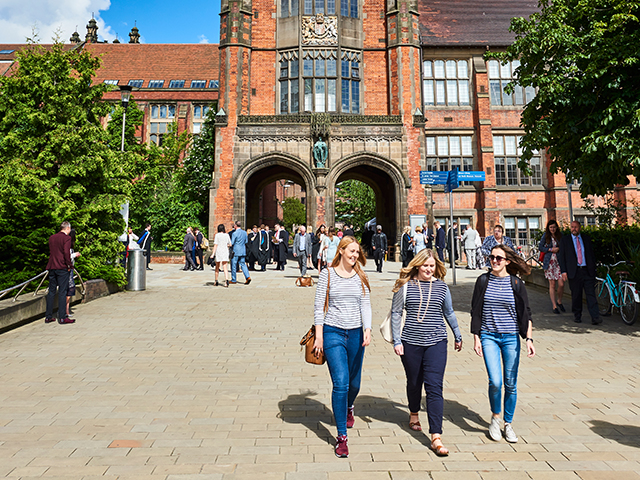Biomedicine, Biology and Pharmacy International Foundation
This campus based course prepares you for your undergraduate degree in Science at Newcastle University. This course is full time for three or four terms.
Course overview
This course gives you the opportunity develop your practical skills in modern laboratories. Field trips will also give you the experience in practical information gathering, and provide you material for discussion during seminars.
All degrees in our School of Biomedical, Nutritional, and Sport Sciences share a common first year meaning have the flexibility to change from one to another.
Successful completion of this programme will lead to you being awarded our International Foundation Certificate (RQF Level 3).
Progression
You're guaranteed a place on one of our designated undergraduate degrees at Newcastle if you successfully complete the International Foundation in Biological and Biomedical Sciences.
As a successful pathway student, you’ll have access to a number of Newcastle progression options. Each progression option will follow a specific pathway and specific requirements for both English/study skills and overall grade. You’ll also find some courses have specific requirements, such as:
- successfully completing an interview;
- having previously studied a relevant discipline;
- having previously completed a degree; or
- having IELTS 6.0 or equivalent in English language
Your progression options
Biology
Biomedical Sciences
- Biochemistry BSc Honours (C700)
- Biochemistry (Integrated Master's) MSci Honours (C701)
- Biomedical Genetics BSc Honours (B901)
- Biomedical Genetics (Integrated Master's) MSci Honours (B903)
- Biomedical Sciences BSc Honours (B940)
- Biomedical Sciences (Integrated Master's) MSci Honours (B900)
- Biomedical Sciences (Deferred choice) BSc Honours (B902)
- Pharmacology BSc Honours (B210)
- Pharmacology MSci Honours (B211)
- Physiological Sciences BSc Honours (B100)
- Physiological Sciences MSci Honours (B122)
Chemistry
- Chemistry BSc Honours (F100)
- Chemistry MChem Honours (F103)
- Chemistry with Medicinal Chemistry BSc Honours (F151)
- Chemistry with Medicinal Chemistry MChem Honours (F123)
Marine Sciences
Natural and Environmental Sciences
- Agri-Business Management BSc Honours (N280)
- Animal Science BSc Honours (C305)
- Environmental Science BSc Honours (F850)
Nutrition and Sports Sciences
- Human Nutrition with placement BSc Honours (B4D6)
- Nutrition with Food Marketing BSc Honours (BD46)
- Sport and Exercise Sciences BSc Honours (C600)
Pharmacy
Psychology
Quality and ranking
Subject-based rankings
- 4th in the UK – The Guardian University Guide 2025 (Animal Science and Agriculture category)
- 6th in the UK – The Guardian University Guide 2025 (Anatomy and Physiology category)
- 7th in the UK – The Complete University Guide 2025 (Food Science category)
- 7th in the UK – Sunday Times Good University Guide 2025 (Pharmacy and Pharmacology category)
- 8th in the UK – Sunday Times Good University Guide 2025 (Anatomy and Physiology category)
- 9th in the UK – Sunday Times Good University Guide 2025 (Animal Sciences category)
- 12th in the UK – The Complete University Guide 2025 (Pharmacology and Pharmacy category)
- 13th in the UK – The Complete University Guide 2025 (Sports Science category)
- 14th in the UK – The Complete University Guide 2025 (Biomedical Sciences category)
- 20th in the UK – The Guardian University Guide 2025 (Earth and Marine Sciences category)
- 20th in the UK – Sunday Times Good University Guide 2025 (Food Science category)
- 24th in the UK – The Complete University Guide 2025 (Chemistry category)
- Top 95 for Life Sciences and Medicine - QS World University Rankings by Subject 2025
- Top 100 for Anatomy and Physiology - QS World University Rankings by Subject 2025
- Top 100 for Earth and Marine Sciences - QS World University Rankings by Subject 2025
- Top 140 for Biological Sciences - QS World University Rankings by Subject 2025
- Top 125 for Life Sciences – Times Higher Education World University Rankings by Subject 2025
- Top 150 for Pharmacy and Pharmacology - QS World University Rankings by Subject 2025
- Top 150 for Psychology – Times Higher Education World University Rankings by Subject 2025
- Top 200 for Psychology - QS World University Rankings by Subject 2025
University-wide rankings
- Top 25 in the UK and Top 100 in the world for sustainable development – Times Higher Education Impact Rankings 2024
- Global Top 140 University - QS World University Rankings 2026
- 65% increase in research power since 2014 – Research Excellence Framework 2021
- 42% of our research is classified as 4* world-leading research – Research Excellence Framework 2021
- Global Top 170 University - Times Higher Education World University Rankings 2024
Core modules (80 credits)
Chemistry (20 credits)
You will be expected to have a basic grounding in chemistry. This module develops the concepts in physical, inorganic and organic chemistry required for studying at degree level in physical sciences, engineering or biological sciences.
It also includes laboratory and project work to supplement theoretical studies.
English for Academic Purposes (20 or 40 credits)
This module is designed to help you develop your skills and confidence in academic English. Four key skill areas are developed in an integrated and task-oriented way:
- reading
- writing
- listening
- speaking
The module will encourage you to take responsibility for your learning and a lot of emphasis is placed on:
- private study
- student research
- student-led presentations
- seminar discussions
- e-learning
- group work
Mathematics and Statistics (20 credits)
This module builds on basic mathematical knowledge to prepare you in areas of mathematics and statistics required in biological sciences and some physical sciences (excluding mathematics, physics, chemistry and engineering).
The module covers mathematics, from basic algebra through to an introduction to differential and integral calculus, while the statistics covered focuses on key data handling, presentation and analysis skills.
Study Skills and ICT (20 credits)
This module is designed to help you adjust to the specific nature, demands and expectations of UK higher education. The skills covered will include:
- taking notes in lectures and making notes from texts
- library and information skills
- using and interpreting data
- planning, preparing and checking assignments
- team-working skills
- oral presentation skills
- seminar skills
- examination and revision techniques
- proofreading
- using dictionaries and academic reference books
- information literacy and time management
You will also develop competence in core ICT skills including:
- the use of Word
- Excel
- PowerPoint
- graphs and interpreting data
- web-based learning systems
Specialist modules (40 credits)
Foundation Biology (20 or 40 credits)
This module provides an introduction to cell biology to give you a strong understanding of the processes involved in cellular life and their roles in the function, reproduction and development of living organisms.
Topics include:
- enzymes
- biochemistry of energy production
- molecular genetics
- genetics of inheritance
It combines theoretical, laboratory and case-study work. Your learning experience is also supplemented with field trips to the Centre for Life and Newcastle University’s Electron Microscopy Unit.
Foundation Physics
This module builds on basic physics knowledge to develop the descriptive and mathematical understanding of principles required for studying physical sciences and engineering at higher levels.
The module combines theoretical principles, practical applications and laboratory work.
Teaching and assessment
Teaching
Class hours: 26 hours per week minimum
Class sizes: Average of 20 students per class for English language teaching
Age requirement: 17 years and above
Assessment
Entry to all honours degrees at Newcastle University is highly competitive, and students hoping to progress to Newcastle must maintain high standards throughout their programme.
Whilst your grades in the Foundation programme do not count towards the final degree, your performance will be used to determine whether you meet the specified progression grades for direct entry to your chosen degree at the University. Assessment is both formal and informal.
Informally you will be given advice and feedback throughout your programme from your teachers. You will also be assessed via a combination of examinations at the end of each semester and coursework including:
- written essays
- reports
- field notebooks
- practical exercises
- group and individual research projects
- bibliographical searches
- oral and video presentations
- problem solving
Careers and employability
With 5 QS Stars for Student Employability (2024), Newcastle University consistently has one of the best records for graduate employment in the UK.
We provide an extensive range of opportunities to all students through an initiative called ncl+. This enables you to develop personal, employability and enterprise skills and to give you the edge in the employment market after you graduate.
Our award-winning Careers Service is one of the largest and best in the country, and we have strong links with employers.
Find out more about careers and employability at Newcastle University.
Entry requirements
To study on this course you need to meet the following entry requirements.
All candidates are considered on an individual basis. If your qualifications are not listed here, please see our additional entry requirements web pages to find out which other qualifications are considered.
The entrance requirements below apply to 2024/2025 entry.
English requirements
Three term: a minimum of IELTS 5.5 (with a minimum of 5.0 in any subskill) or an equivalent score
Four term: a minimum of IELTS 5.0 (with a minimum of 4.5 in all subskills) or an equivalent score
If you do not meet the minimum English language requirements you should apply for Academic English.
Additional fees
Laboratory fee: £500
Enrolment fee: an extra charge of £250 per academic course, charged on confirmation
Text books: £75 - £415
Accommodation is not included in the fees. View your Newcastle University International Study Centre accommodation options.

